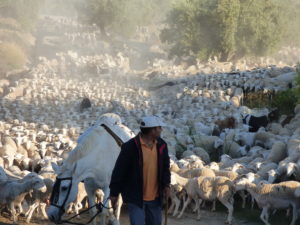 Euromontana congratulates the Committee of the Regions (CoR) on the unanimous adoption of its report “Pastoralism” by Jacques Blanc on 9 October 2019. Euromontana had contributed to the preparation of this report in spring 2019 and is pleased to see that many positions are shared with the CoR.
Euromontana congratulates the Committee of the Regions (CoR) on the unanimous adoption of its report “Pastoralism” by Jacques Blanc on 9 October 2019. Euromontana had contributed to the preparation of this report in spring 2019 and is pleased to see that many positions are shared with the CoR.
Among the measures requested by the CoR, we will highlight the following ones that have a particular impact on our mountain areas.
Future of the CAP
- The CoR “asks that it be made it compulsory for Member States with mountain areas to implement an integrated mountain policy making targeted use of a substantial part of the tools available (payments for natural constraints, support for second-pillar disadvantaged areas, a specific sub-programme for mountain areas), endowing it with a budget for these purposes that is commensurate with the importance of such areas“;
- It also “suggests, to support the continuation of farming in less favoured areas and areas with handicaps, that the compensatory allowance for natural handicaps (CANH) should be mandatory in those Member States where it may be applicable“;
- The CoR also “calls on the EU to recognise the ecosystem services provided by farmers and owners of mountain forest” and to “grant fair compensation in the light of these services which contribute to the well-being of the entire population“.
More generally, to support pastoralism in the framework of the post-2020 CAP:
- The Cor “calls for, in the reorientation of CAP support, greater consideration to be given to extensive and sustainable pastoralism and livestock farming“;
- “Welcomes the proposal of the European Parliament AGRI Committee to allow the recognition of areas of pasture with a shrub and tree component as agricultural production areas eligible for basic payment rights“;
- “Supports the proposal of the European Parliament ENVI Committee to define on-farm animal density limits and to limit subsidies to farms exceeding these limits“;
- “Encourages Member States and local authorities to finance investments in pastoral areas that often lack mechanisable access, to support agricultural and pastoral land management, to facilitate access to land for pastoralists and to create support systems adapted to collective management practices“;
Mountain food products
The CoR:
- “Asks the EU to continue to stimulate the development of agricultural products bearing quality labels and to create added value by protecting high-quality agri-food products from pastoral livestock farming. The Member States must in particular be encouraged to use the “mountain product” optional quality term, which is not always used in most countries despite having been adopted in 2014“;
- “calls for the term “milk, cheese and meat from grazing” to be reserved for products that guarantee that more than 80% of animal feed comes from pasture used during the grazing season“;
Large carnivores
The CoR:
- “Calls for the biodiversity strategy to be based on a new specific fund for species conservation. The fund should cover compensation for damage caused by large carnivores, the cost of which is rising sharply, and the protection of livestock, something that can take up an increasing proportion of EAFRD funds at a time when the budget is being significantly reduced. If such a new fund is not created, the existing financial instruments at regional (where applicable), national and EU level (including the EAFRD) will have to be used“;
- “Welcomes the proposal by Parliament’s AGRI Committee to amend Article 68 of the same regulation so that the EAFRD can continue to support the purchase of dogs for the protection of livestock from large predators“;
- The CoR also “calls on the Commission to assess the need to revise the Habitat Directive (upwards or downwards) following the publication of the next State of Nature in the EU Report in 2020, taking into account the results of the action plan on the environment, the populations and the economic impact, depending on the conservation status of the different species and habitats“.
Other measures to support pastoralism
In order to enhance the attractiveness of pastoral occupations and a better transmission of knowledge, the CoR stresses the need for “better training, in particular on leading animals to pasture and their health management, but also on the protection of livestock and the management of guard dogs, together with the introduction of mentoring schemes with experienced practitioners, would allow for better transfer of knowledge. With regard to shepherds, improving their living and working conditions in mountain pastures and in farming areas, including in Mediterranean areas, investing in infrastructure to provide decent living conditions and proper working conditions, drawing up collective agreements and organising job fairs to recruit seasonal workers are all incentives that should be built upon.“
Finally, the CoR “asks the EU to develop an ambitious policy to safeguard forests against fire by promoting the presence of livestock in woods and heathland” and encourages European Institutions to support the “UNESCO project on “heritage and the EU” aimed at using world heritage as a tool to enhance the economic and social sustainability of rural areas in Europe“.
Euromontana hopes that the CoR’s opinion will be heard by the Council and Parliament, in particular for the finalisation of the legislative proposals for the future CAP. For more information, you can also see the report and presentations of the workshop on the attractiveness of pastoralism, organised by Euromontana in March 2018 in Moutiers.
Euromontana will produce a report on sustainable pasture management as part of its OREKA MENDIAN project by the end of 2020.
25 October 2019









